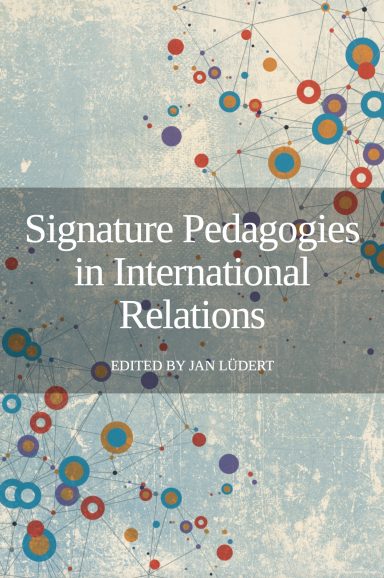This volume builds on Scholarship of Teaching and Learning research to showcase a wide range of IR teaching and learning frameworks. Contributors explore their signature pedagogies relevant to the study and practice of teaching IR by detailing how pedagogical practices and their underlying assumptions influence how we teach and impart knowledge. Authors critically engage with their approaches by exploring the following questions: What concrete and practical acts of teaching and learning do we employ? What implicit and explicit assumptions do we impart to students about the world of politics? What values and beliefs about professional attitudes and dispositions do we foster and in preparing students for a wide range of possible careers? Authors, as such, provide educators, students, and practitioners’ pedagogical insights and practical ways for developing their own teaching and learning approaches.
Signature Pedagogies in International Relations
Table of contents
Signature Pedagogies in International Relations – Jan Lüdert
Teaching International Relations as a Liberal Art – Lisa Macleod
Signature Pedagogies and International Relations Theory: From Thoughtlessness to Citizenship – Mathew Davies
Shall We Destroy the Teacher? What English Language Teachers Can Teach IR About Pedagogy – Daniel Clausen
Fostering Ontological Agility: A Pedagogical Imperative – Tamara A. Trownsell
Marks That Matter: Slow Letters to Authors and Selves – Erzsébet Strausz
Travel Learning Clusters as Signature Pedagogies – Shane Joshua Barter
Student Led Advocacy and the “Scholars in Prison” Project: Experiential Learning and Critical Knowledge(s) in International Relations – William J. Shelling II and Jenny H. Peterson
Killing Your Students: Signature Pedagogies and the Use of Violence in In-Class Simulations – David Andersen-Rodgers
Supervising IR Dissertations: Using Personal Anecdotes to Reflect a Strategy for Supervision – Archie W. Simpson
Teaching and Learning International Relations Professional Skills Through Simulations – Patricia Capelini Borelli, Patrícia Nogueira Rinaldi, Roberta Silva Machado and Talita De Mello Pinotti
Teaching IR Through Short Iterated Simulations: A Sequenced Approach for IR Courses – Xiaoye She
Teaching International Relations in The Undergraduate Classroom: The Use of Metaphors, Simulations, And Games – Ismail Erkam Sula
Enhancing Creativity and Communication Skills Through IR Signature Pedagogies – Xira Ruiz-Campillo, Kattya Cascante Hernández and Antonio Moreno Cantano
This volume offers an informative and highly readable examination of pedagogic approaches from an international perspective. In doing so, it presents an admirably diverse array of teaching and learning frameworks from educators in different systems and geographic locations. The volume is notable for its critical eye and attention to the practical implications and applications of pedagogy as contributors describe, situate, and reflect upon their own signature pedagogies. The result is a thought-provoking, and thoughtful, collection that is at once personal in its insights and generalisable for those looking to develop their own teaching and learning skillsets.
A thrilling volume on signature pedagogies and International Relations that offers the worldwide community of educators in this field with timely guidance on the signature pedagogies model. The book edited by Jan Lüdert summons IR educators to raise awareness on the worldviews and values they impart on their students through their pedagagical choices, while also vindicating the practical dimension of IR. The book invites to envisage the situatedness of the IR classroom in the world -namely, in a world that needs to be acted upon by future practitioners, activists or scholars. Thirteen chapters in the volume offer detailed reasoning and experience-based insights into a selection of active learning strategies which range from the well-known simulations to the rarer anecdote-based learning. A volume that will accompany many IR teachers in their noble commitment with good teaching.
By its very nature broad and inclusive almost beyond description, International Relations (IR), as a field of study, calls for pedagogical practices no less diverse, and no less interwoven. This book not only meets those criteria; it goes beyond them, introducing readers to the signature teaching and learning frameworks of over a dozen scholars worldwide. Whether field-based or classroom-based, or some creative, experiential combination of the two; whether career-based or wholly non-vocational; whether game-less or employing this simulation or that, storytelling or Model United Nations (MUNs), for example; all the signature pedagogies here share a common goal, the uplifting of students and teachers alike in a unique form of social capital building, one in which the sense of self is made to align not with any particular in-group or community, but with the generic idea of community itself, a vibrant and healthy associational life.
What for one author is about “facilitating thoughtfulness,” for another about “disrupting surface structures in our thinking,” and for still another about “ontological agility” and the de-provincialization of IR, is for all pedagogies here an aversion against presenting this theory or that as an absolute right or an absolute wrong, wanting to adjudicate between them all, past, present, and future, as neither dependent nor interdependent ways of knowing. And toward what end? —toward the creation of global citizens with the wisdom, courage, and compassion to make a positive difference in the world wherever they find themselves. At the same time, as one author argues, this points to the liberal arts tradition of “know thyself” first as the proper measure of knowledge acquisition, but more than that as the stimulus to life-long learning—analytical ability, curiosity, and imagination at the center.
This book will truly resonate with all readers. There is something here for everybody.
